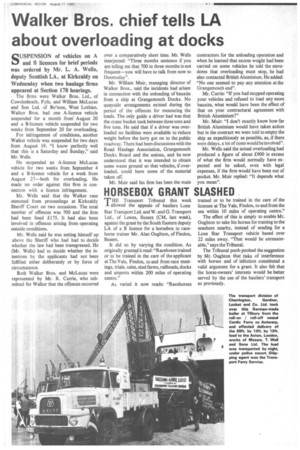Walker Bros. chief tells LA about overloading at docks
Page 23

If you've noticed an error in this article please click here to report it so we can fix it.
SUSPENSION of vehicles on A and B licences for brief periods was ordered by Mr. L. A. Wells, deputy Scottish LA, at Kirkcaldy on Wednesday when two haulage firms appeared at Section 178 hearings.
The firms were Walker Bros. Ltd., of Cowdenbeath, Fyfe, and William McLucas and Son Ltd. of Bo'ness, West Lothian. Walker Bros. had one A-licence vehicle suspended for a month frotn` August 20 and a B-licence vehicle suspended for two weeks from September 20 for overloading.
For infringement of conditions, another Walker vehicle was suspended for two days from August 19. "I know perfectly well that this is a Saturday and Sunday," said Mr. Wells.
He suspended an A-licence McLucas vehicle for two weeks from September 4 and a B-licence vehicle for a week from August 27—both for overloading. He made no order against this firm in connection with a licence infringement.
Mr. Wells said that the Walker case stemmed from proceedings at Kirkcaldy Sheriff Court on two occasions. The total number of offences was 700 and the firm had been lined £.175. It had also been involved in offences arising from operating outside conditions.
Mr. Wells said he was setting himself up above the Sheriff who had had to decide whether the law had been transgressed. He (Mr. Wells) had to decide whether the intentions by the applicants had not been fulfilled either deliberately or by force of circumstance.
Both Walker Bros. and McLucas were represented by Mr. R. Currie, who submitted for Walker that the offences occurred over a comparatively short time. Mr. Wells interjected: "Three months sentence if you are telling me that 700 in three months is not frequent—you will have to talk from now to Doomsday".
Mr. William Muir, managing director of Walker Bros., said the incidents had arisen in connection with the unloading of bauxite from a ship at Grangemouth Docks. No quayside arrangements existed during the period of the offences for measuring the loads. The only guide a driver had was that the crane bucket took between three tons and five tons. He said that if a driver was overloaded no facilities were available to reduce weight before the lorry got on to the public roadway. There had been discussions with the Road Haulage Association, Grangemouth Docks Board and the unions, and he now understood that it was intended to obtain some waste ground so that vehicles, if overloaded, could have some of the material taken off.
Mr. Muir said his firm has been the main contractors for the unloading operation and when he learned that excess weight had been carried on some vehicles he told the stevedores that overloading must stop, he had also contacted British Aluminium. He added: "No one seemed to pay any attention at the Grangemouth end".
Mr. Currie: "If you had stopped operating your vehicles and refused to load any more bauxite, what would have been the effect of that on your contractural agreement with British Aluminium?"
Mr. Muir: "I don't exactly know how far British Aluminium would have taken action but in the contract we were told to empty the ship as expeditiously as possible, as, if there were delays, a lot of costs would beinvolved".
Mr. Wells said the actual overloading had produced a figure of about £900 in excess of what the firm would normally have expected and he asked, even with legal expenses, if the firm would have been out of pocket. Mr. Muir replied: "It depends what you mean".












































































































